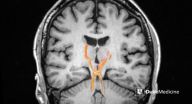INFORMATION:
The paper was authored by a team from the University of Oxford, the University of Groningen; University Medical Center Groningen; London School of Hygiene and Tropical Medicine; and Queensland Brain Institute, Australia.
For further information, contact the University of Oxford News Office at news.office@admin.ox.ac.uk or Tel: +44(0)1865 280534.
Notes for Editors
The paper, 'Human Fertility, molecular genetics, and natural selection in modern societies' by Felix C. Tropf, Gert Stulp, Nicola Barban, Peter M. Visscher , Jian Yang, Harold Snieder and Melinda C. Mills is due to be published in the journal, PLOS ONE, on 3 June 2015.
Once live, the paper will appear at http://dx.plos.org/10.1371/journal.pone.0126821
For the Netherlands sample, the data used was from the Lifelines Cohort Study, a population-based study examining the health and health-related behaviours of three generations of 167,000 people living in the north. It includes genotyped information from more than 13,000 unrelated individuals.
For the UK, the data was from TwinsUK, the largest adult twin registry in the country with more than 12,000 respondents. The research team randomly selected only one twin for analysis and controlled for dizygotic twinning as a genetically related process.
Study pinpoints what part genes play in the age of first-time mums and family size
Researchers analyse the genomes of thousands of women in the UK and the Netherlands
2015-06-03
(Press-News.org) Researchers have analysed the genomes of thousands of women in the UK and the Netherlands to measure the extent to which a woman's genes play a role for when she has her first baby and how many children she will have. Significantly, they have found that some women are genetically predisposed to have children earlier than others, and conclude that they have passed down their reproductive advantage to the next generation. They also find, however, that while modern women who were born in the 20th century might be expected to have babies even earlier than previous generations did, they are delaying motherhood. Their study, published in the latest issue of the journal, PLOS ONE, says women in modern societies are 'over-riding' natural selection because of the stronger effect of lifestyle choices and social factors.
The research was carried out by an international team working on the Sociogenome project, led by the University of Oxford and funded by the European Research Council. The researchers exploited the latest advances in molecular and quantitative genetics taking existing datasets of 4,300 unrelated women in the Netherlands from the Lifelines Cohort Study. They combined these results with data relating to 2,400 women from TwinsUK, the country's largest adult twin registry (from which they randomly selected only one twin for analysis).
The researchers found that genes account for about 15 per cent of the differences between modern women when they have their first baby, and 10 per cent in the differences in the number of children they have. They also discovered an overlap between these genetic effects that the study says partly explains why women who have children earlier also have a higher number of children.
Previous similar studies have relied on datasets relating to twins or within families, but this is the first time that researchers have used molecular genetic information of unrelated women including the population-based Lifelines Study. By combining the genetic results of both datasets from this large sample, they found that natural selection is not just an historical process. Modern societies are still evolving today, with early fertility patterns being an inherited reproductive advantage, says the paper.
Project leader Professor Melinda Mills, from the Department of Sociology at the University of Oxford and Nuffield College, said: 'In evolutionary and genetic terms, this suggests that younger generations today should be inclined to have children at an earlier age than women in the past. However, what we actually observe is that the reverse is happening. Social and environmental factors mean women in modern societies are delaying starting families, knowing that there is the risk of becoming infertile if they leave it too late. This research tells us there are genetic differences between women which could be significant for women making decisions about when to have their first baby.'
Lead author Felix Tropf, from the University of Groningen in the Netherlands, said: 'In the second half of the 20th century, women across many societies delayed starting a family. Although genes play a significant part, it seems wider social changes, such as an expansion of women in further education and work, as well as the availability of effective contraception, are having a stronger effect on determining when women in modern societies have children.'
ELSE PRESS RELEASES FROM THIS DATE:
Scientist at LIMR leads study demonstrating drug-induced tissue regeneration
2015-06-03
WYNNEWOOD, PA--June 3, 2015--a study led by Ellen Heber-Katz, PhD, of the Lankenau Institute for Medical Research (LIMR), part of Main Line Health (MLH), shows that a primordial form of energy production that still exists in mammals can be harnessed to achieve spontaneous tissue regeneration in mice, without the need for added stem cells. The study findings were reported in the June 3, 2015, issue of Science Translational Medicine, a peer-reviewed journal of the American Association for the Advancement of Science. Key collaborators in the study, which was supported by grants ...
How to cut a vortex into slices
2015-06-03
A lot of problems, associated with the mixing of the liquid in the microchannels, could be solved via proper organization of the inhomogeneous slip on the walls of these channels. This is the conclusion made by the joint group of Russian and German scientists lead by Olga Vinogradova, who is a professor at the M.V. Lomonosov Moscow State University and also a head of laboratory at the A.N. Frumkin Institute of Physical chemistry and Electrochemistry of the Russian Academy of Sciences. The article describing their theory was published in the latest issue of the journal ...
Genetic variation of stress hormone receptor may affect vulnerability to major depression
2015-06-03
Scientists are beginning to unwrap the biology behind why some people are more prone to major depression and other psychiatric disorders than others when experiencing stressful life events. The researchers found that cellular activity in response to stress hormone receptor activation differs from individual to individual. The study, led by Janine Arloth, Ryan Bogdan, and Elisabeth Binder at the Max Planck Institute of Psychiatry in Germany, also shows that the genetic variations underlying this difference in stress response correlate with dysfunction in the amygdala, a ...
Researchers find speedometer in the brain
2015-06-03
This news release is available in German. Scientists at the German Center for Neurodegenerative Diseases (DZNE) and the University of Bonn led by Prof. Stefan Remy report on this in the journal "Neuron". Their investigations give new insights into the workings of spatial memory. Furthermore, they could also help improve our understanding of movement related symptoms associated with Parkinson's disease.
In a familiar environment our movements are purposeful. For example, if we leave our office desk for a coffee break, we naturally follow a predefined route that has ...
Eukaryotes: A new timetable of evolution
2015-06-03
This news release is available in German.
Contaminated samples have evidently created some confusion in the timetable of life. On the basis of ultra-clean analyses, an international team, including scientists from the Max Planck Institute for Biogeochemistry, has disproved supposed evidence that eukaryotes originated 2.5 to 2.8 billion years ago. In contrast to prokaryotes such as bacteria, eukaryotes have a nucleus. Some researchers thought they had discovered molecular remnants of living organisms in rock samples up to 2.8 billion years old. However, as the ...
Long-term memory formation
2015-06-03
A team of New York University neuroscientists has determined how a pair of growth factor molecules contributes to long-term memory formation, a finding that appears in the journal Neuron.
"These results give us a better understanding of memory's architecture and, specifically, how molecules act as a network in creating long-term memories," explains the paper's senior author, Thomas Carew, a professor in NYU's Center for Neural Science and dean of NYU's Faculty of Arts and Science. "More importantly, this marks another step toward elucidating the intricacies of memory ...
MRI technology reveals deep brain pathways in unprecedented detail
2015-06-03
DURHAM, N.C. - Scientists at Duke Medicine have produced a 3-D map of the human brain stem at an unprecedented level of detail using MRI technology.
In a study to be published June 3 in Human Brain Mapping, the researchers unveil an ultra high-resolution brain stem model that could better guide brain surgeons treating conditions such as tremors and Parkinson's disease with deep brain stimulation (DBS).
The new 3-D model could eliminate risky trial-and-error as surgeons implant electrodes -- a change akin to trading an outdated paper road atlas for a real-time GPS.
"On ...
Scientists produce strongest evidence yet of schizophrenia's causes
2015-06-03
An international team of scientists led by Cardiff University researchers has provided the strongest evidence yet of what causes schizophrenia - a condition that affects around 1% of the global population.
Published today (17:00BST, 03/06/2015) in the journal Neuron, their work presents strong evidence that disruption of a delicate chemical balance in the brain is heavily implicated in the disorder.
In the largest ever study of its kind, the team found that disease-linked mutations disrupt specific sets of genes contributing to excitatory and inhibitory signalling, ...
Large majority of Americans -- including gun owners -- support stronger gun policies
2015-06-03
A large majority of Americans--including gun owners--continue to support stronger policies to prevent gun violence than are present in current federal and most state law, according to a new national public opinion survey conducted by researchers with the Johns Hopkins Center for Gun Policy and Research at the Bloomberg School of Public Health.
The survey is a follow-up to one conducted by the same researchers in early 2013, shortly after the shooting at the Sandy Hook Elementary School in Newtown, Connecticut that left 26 dead.
The results are published online in Preventive ...
Montreal researchers develop ultra-tough fiber that imitates the structure of spider silk
2015-06-03
This news release is available in French. Professors Frederick Gosselin and Daniel Therriault, along with their master's student Renaud Passieux, are not related to Spiderman. Nevertheless, these Polytechnique Montreal researchers have produced an ultra-tough polymer fibre directly inspired by spider silk! They recently published an article about the project in the journal Advanced Materials.
Spider silk: a thread with stunning properties
Three to eight microns in diameter but five to ten times tougher than steel or Kevlar: despite its lightness, spider silk has ...
LAST 30 PRESS RELEASES:
Study: Reported crop yield gains from breeding may be overstated
Stem cells from human baby teeth show promise for treating cerebral palsy
Chimps’ love for crystals could help us understand our own ancestors’ fascination with these stones
Vaginal estrogen therapy not linked to cancer recurrence in survivors of endometrial cancer
How estrogen helps protect women from high blood pressure
Breaking the efficiency barrier: Researchers propose multi-stage solar system to harness the full spectrum
A new name, a new beginning: Building a green energy future together
From algorithms to atoms: How artificial intelligence is accelerating the discovery of next-generation energy materials
Loneliness linked to fear of embarrassment: teen research
New MOH–NUS Fellowship launched to strengthen everyday ethics in Singapore’s healthcare sector
Sungkyunkwan University researchers develop next-generation transparent electrode without rare metal indium
What's going on inside quantum computers?: New method simplifies process tomography
This ancient plant-eater had a twisted jaw and sideways-facing teeth
Jackdaw chicks listen to adults to learn about predators
Toxic algal bloom has taken a heavy toll on mental health
Beyond silicon: SKKU team presents Indium Selenide roadmap for ultra-low-power AI and quantum computing
Sugar comforts newborn babies during painful procedures
Pollen exposure linked to poorer exam results taken at the end of secondary school
7 hours 18 mins may be optimal sleep length for avoiding type 2 diabetes precursor
Around 6 deaths a year linked to clubbing in the UK
Children’s development set back years by Covid lockdowns, study reveals
Four decades of data give unique insight into the Sun’s inner life
Urban trees can absorb more CO₂ than cars emit during summer
Fund for Science and Technology awards $15 million to Scripps Oceanography
New NIH grant advances Lupus protein research
New farm-scale biochar system could cut agricultural emissions by 75 percent while removing carbon from the atmosphere
From herbal waste to high performance clean water material: Turning traditional medicine residues into powerful biochar
New sulfur-iron biochar shows powerful ability to lock up arsenic and cadmium in contaminated soils
AI-driven chart review accurately identifies potential rare disease trial participants in new study
Paleontologist Stephen Chester and colleagues reveal new clues about early primate evolution
[Press-News.org] Study pinpoints what part genes play in the age of first-time mums and family sizeResearchers analyse the genomes of thousands of women in the UK and the Netherlands


